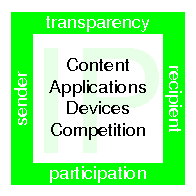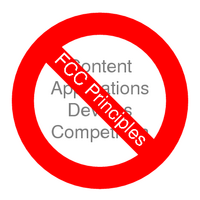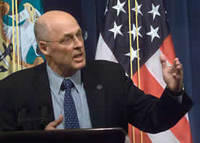 A national broadband policy is what you get when you put bellheads in charge.
Fortunately, Scott Bradner has been on the Internet since the beginning,
and explains the difference.
A national broadband policy is what you get when you put bellheads in charge.
Fortunately, Scott Bradner has been on the Internet since the beginning,
and explains the difference.
Broadband is not the Internet. Broadband is shorthand for a diverse class of wired and wireless digital transmission technologies. The Internet, in contrast, is a set of public protocols for inter-networking systems that specifies how data packets are structured and processed. Broadband technologies, at their essence, are high-capacity and always-on. The essence of the Internet is (a) that it carries all packets that follow its protocols regardless of what kinds of data the packets carry, (b) that it can interconnect all networks that follow those protocols, and (c) its protocols are defined via well-established public processes.It’s a petition. Please sign it.There’s risk in confusing broadband and Internet. If the National Broadband Plan starts from the premise that the U.S. needs the innovation, increased productivity, new ideas and freedoms of expression that the Internet affords, then the Plan will be shaped around the Internet. If, instead, the Plan is premised on a need for broadband, it fails to address the ARRA’s mandated objectives directly. More importantly, the premise that broadband is the primary goal entertains the remaking of the Internet in ways that could put its benefits at risk. The primary goal of the Plan should be broadband connections to the Internet.
-jsq
PS:
Therefore, we urge that the FCC’s National Broadband Plan emphasize that broadband connection to the Internet is the primary goal. In addition, we strongly suggest that the Plan incorporate the FCC Internet Policy Statement of 2005 and extend it to (a) include consumer information that meaningfully specifies connection performance and identifies any throttling, filtering, packet inspection, data collection, et cetera, that the provider imposes upon the connection, (b) prohibit discriminatory or preferential treatment of packets based on sender, recipient or packet contents. Finally, we suggest that the Internet is such a critical infrastructure that enforcement of mandated behavior should be accompanied by penalties severe enough to deter those behaviors.While you’re at it, urge the FCC to stop talking about “consumers” and start talking about participants.





